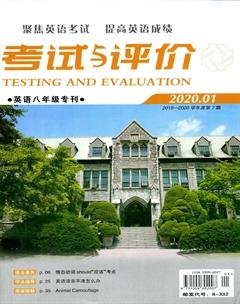Unit 2词汇要点讲解
李天雨
1. cheer v. 欢呼;喝彩
Every time our basketball team scores a goal, each of our classmates cheers loudly. 每当我们篮球队进了球,我们每个同学都大声欢呼。
Dear students, please cheer for our youth. 同学们,请为我们的青春喝彩。
【拓展】 cheer up 振奋起来
I think he misses her terribly. You might cheer him up. 我估计他是太想念她了。也许你可以让他打起点儿精神来。
2. satisfaction n. 满足;满意
He was glad and nodded with satisfaction. 他很高兴,满意地点头。
【拓展】 satisfying adj. 令人满意的;令人满足的,形容物;satisfied adj. 感到满意的,形容人;satisfy vi. 令人满意;令人满足vt. 满足;使满意
3. volunteer n. 义务工作者;志愿者
vt. 义务(做);自愿(做)
She was a volunteer; she hadnt had to be press-ganged. 她是一个志愿者,不一定非是受人迫使的。
They volunteered to repair the house for the old lady. 他们主动提出替老太太修缮房子。
4. lonely adj. 孤独的;寂寞的
I feel very lonely without my good friend. 我的好朋友不在旁边我就很寂寞。
【辨析】 lonely和alone
lonely是形容词,alone是副词。lonely是指心灵上的,意为“寂寞,孤独”。alone是指行为或动作上的,意为“单独,独自”。
She lives alone and often feels lonely. 她孑然一身,常感到寂寞。
I dont like going out alone at night. 我不喜欢夜晚单独外出。
5. excited adj. 激动的;兴奋的
I am excited at the news. 听到这个消息我很兴奋。
Are you excited about going to Beijing? 你对去北京感到兴奋吗?
【辨析】 excited和exciting
excited与 exciting都是形容词。excited意为“兴奋的”,一般修饰人;而exciting意为“令人感到兴奋的”,一般修饰物。如:interest, frighten, surprise, move, terrify等,这些词的 -ed形容词和-ing形容词的用法都与之相似。
6. disabled adj. 丧失能力的;有残疾的
The accident disabled his father for work last year. 去年的一起事故使他的爸爸丧失了工作能力。
Her family is very poor because her father is ill and he is disabled. 她的家庭很穷,因为她父亲病了,而且残疾。
7. understand v. 懂;理解;領会
understand的过去式是understood。
They are too young to understand what is going on. 他们还太小,不明白发生了什么事。
It would be nice to have someone who really understood me, a friend. 要是有个真正理解我的朋友就好了。
8. several pron. 几个;数个;数人;数件物
Several hundred students are climbing the mountain. 几百名学生正在爬山。
Theyve been to the hospital several times. 他们已经去医院好几次了。
9. feeling n. 感觉,感触
It doesnt matter if you fail. I know your feeling now. 失败了没关系,我理解你此刻的感受。
I also had a strange feeling in my neck. 我的脖子感觉也很奇怪。
10. journey n. (尤指长途)旅行,行程
When you make a journey, you might travel from your hometown to my city. 当你旅行的时候,你可以从你的家乡旅行到我的城市。
【辨析】 trip, journey和travel
(1) trip常指短距离的、直达目的地的旅行,在日常用语中,trip可与journey通用。
I am going on a trip to the seaside during the summer holidays. 暑假期间我将去海边旅行。
(2) journey主要指单程较远距离。
Mr. Smith made a journey from Paris to New York. 史密斯先生作了一次从巴黎到纽约的旅行。
(3) travel泛指一般意义的旅行,是不可数名词。
He is fond of travel (= travelling). 他喜欢旅行。
11. fix v. 修理;安装
Can you help me fix my radio? 你能帮我修理一下收音机吗?
【辨析】 mend, repair和fix
三者都表修理。
(1) mend指修理一些小用具、玩具、要缝补的衣物等。
Mom, my coat is broken. Can you mend it? 妈妈,我的上衣坏了,你能帮我缝补一下吗?
(2) repair指修理一些破损、毁坏的、不能正常使用的物品。
When I got home, my father was repairing his bike. 当我到家的时候,爸爸正在修理他的自行车。
(3) fix指大型设备需要安装、装配。
Hes outside fixing the brakes on the car. 他在外面修理汽车的刹车。
12. clean up 打扫干净;整理
We have to clean up the classroom before we leave. 我们必须把教室打扫干净才能走。
【拓展】 动词之后加介词或副词构成短语,表达一种特定的含义,称为短语动词。如:look at 看;look like 看上去像;look after 照料;listen to 听;welcome to 欢迎到……;say hello to 向……问好;speak to 对……说;put on 穿上;take off 脱下;起飞;write down 记下;come on 赶快;get up 起床;come in 进来;sit down 坐下;stand up起立等。
【牛刀小试】
一、根据句意及汉语提示填写所缺单词或短语。
1. You could ________ (分发) food at the food bank to help feed them.
2. I want to ________ (使变得更高兴) my grandparents.
3. —What does your friend want to do this summer holiday?
—He wants to ________ (自愿做) in an orphanage (孤兒院).
4. Look at the ________ (标志) on the wall. Dont use your mobile phone here.
5. Monday is our schools ________ (清洁) Day.
二、用括号内所给动词的适当形式填空。
1. He smiled in ________ (satisfied) when he won the game.
2. We cant put off ________ (make) a plan.
3. The ________ (own) of the shop was cleaning the floor when I walked in.
4. I got the ________ (feel) that he didnt like me.
5. On my way to school, I noticed some
________ (break) chairs on the right side of the road.
三、从方框中选择合适的短语并用其适当形式完成句子。
[ put up, hand out, call up, cheer up,
come up with, give out, put off ]
1. I want to ________ my plan to work in an animal hospital until next summer. Im too busy with my studies this year.
2. She hopes to ________ at least five primary schools to ask if they need volunteers for their after-school programs.
3. Our class is trying to ________ some ideas to ________ sick children because they are often sad.
4. We decided to ________ signs around the school and ________ notices to tell students about the book sale.
5. We will ________ the money from the sale to homeless people.
四、根据汉语意思完成句子。
1. We must find a person ________________ (做这项工作).
2. In my family, my mother is always the first one ________________ (起床).
3. Do you have ________________ (什么问题要问)?
4. Please tell me ________________ (怎样念这个词).
5. I havent decided ________________ (买哪一件衬衫).

